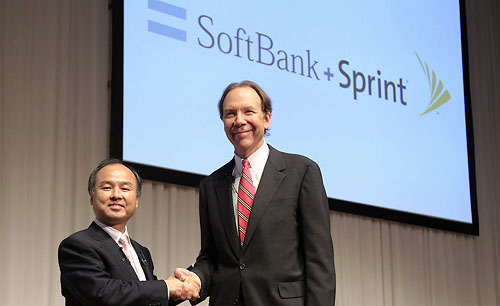|
|
Continue reading ETI Views and News at
econtech.com,
or download a
printer-friendly version.

Follow us on Twitter @EconAndTech
|
|
Sprint on the block
|
|
 Just one year ago, Sprint was ringing alarm bells, warning of the dangers of the proposed merger between AT&T and T-Mobile. Sprint was perhaps the most vociferous opponent of the merger, and for good reason: AT&T's takeover of T-Mobile was bad for consumers and bad for Sprint. AT&T scrapped its merger plans in the waning days of 2011, leaving the market structure for wireless services in the US largely unchanged.
Just one year ago, Sprint was ringing alarm bells, warning of the dangers of the proposed merger between AT&T and T-Mobile. Sprint was perhaps the most vociferous opponent of the merger, and for good reason: AT&T's takeover of T-Mobile was bad for consumers and bad for Sprint. AT&T scrapped its merger plans in the waning days of 2011, leaving the market structure for wireless services in the US largely unchanged.
Fast forward to October 12, 2012. Japanese telecommunications conglomerate SoftBank announced that it will be acquiring a controlling, 70% interest in Sprint in a deal valued at $20.1-billion. The Sprint/SoftBank deal differs in many important respects from AT&T's attempted takeover of T-Mobile – the deal does not increase market concentration in the US nor eliminate a low-cost provider. Sprint's deal is optimistically scheduled to close in the second quarter of 2013, considerably shorter than the time frame that had been contemplated for the AT&T/T-Mobile deal, reflecting great optimism that the necessary regulatory approvals will be gained quickly and painlessly. However, there are elements of the proposed transaction that will almost certainly draw scrutiny, and it is very likely that AT&T (and others) will jump at the chance to vocally question and challenge the Sprint deal.
Foreign ownership
Section 310 of the Telecommunications Act of 1934, as amended, requires that the FCC review foreign investment in electromagnetic spectrum licenses in the US, and imposes restrictions on the foreign ownership of such licenses. Specifically, section 310 states:
(a) Grant to or holding by foreign government or representative
The station license required under this chapter shall not be granted to or held by any foreign government or the representative thereof.
(b) Grant to or holding by alien or representative, foreign corporation, etc.
No broadcast or common carrier or aeronautical en route or aeronautical fixed radio station license shall be granted to or held by—
- any alien or the representative of any alien;
- any corporation organized under the laws of any foreign government;
- any corporation of which more than one-fifth of the capital stock is owned of record or voted by aliens or their representatives or by a foreign government or representative thereof or by any corporation organized under the laws of a foreign country;
- any corporation directly or indirectly controlled by any other corporation of which more than one-fourth of the capital stock is owned of record or voted by aliens, their representatives, or by a foreign government or representative thereof, or by any corporation organized under the laws of a foreign country, if the Commission finds that the public interest will be served by the refusal or revocation of such license.
Section 310 is absolute in its prohibition of any direct foreign ownership (by a government, corporation, or individual) of US radio licences. However, section 310 does permit foreign interests to indirectly invest in US companies that hold radio licences, as long as the foreign interest is less than 25%, or if the FCC deems additional foreign ownership to be in the public interest.
The FCC has historically, in major cases, granted such waivers. Two of the four largest wireless carriers have major foreign interests. Verizon Wireless, formed in 2000, is a partnership between Verizon Communications and Vodafone, a UK company, where Vodafone's share of the Partnership is 49%. The Commission also granted a waiver of the foreign ownership rules when it authorized Deutsche Telekom, and its subsidiary T-Mobile, to acquire the spectrum previously owned by VoiceStream in 2001. In that deal, VoiceStream was renamed T-Mobile USA, and remained a US company. Deutsche Telekom's T-Mobile International AG subsidiary (a German company) took ownership of T-Mobile USA. The proposed Sprint deal would result in a similar ownership structure. SoftBank, a Japanese company, would take a controlling interest in Sprint, which would remain a US company. Sprint will undoubtedly argue that the deal is in the public interest, that SoftBank is injecting much needed capital to allow Sprint to remain competitive, and that AT&T and Verizon have scale advantages that the deal will help to resolve. Some will argue that Sprint is shipping jobs and profits overseas, and that the deal should be squashed. AT&T will probably be more mercurial in its position. AT&T will probably raise questions about the deal, but not flat out oppose it. Given AT&T's recent interest in acquiring T-Mobile, it seems unlikely that AT&T would go on record completely opposing a deal.
Clearwire controlling interest
Just days after announcing the deal with SoftBank, Sprint announced that it had purchased additional shares in Clearwire, bringing Sprint's ownership stake to 50.8% and giving control of the company to Sprint. Clearwire provides wireless services in the US and abroad, with approximately 1.5% market share in the US. But more important than customer market share, Clearwire is a major spectrum owner, with majority holdings of the 2.5 GHz band. Sprint and Clearwire have been cozy partners for some time (Sprint's 2007 launch of its WiMAX network involved spectrum swaps and roaming agreements with Clearwire), but with full control of Clearwire, Sprint would boost its available spectrum holdings dramatically.
For its part, Sprint claims that it doesn't have control of Clearwire. "While we have a majority stake, we do not have control of the company, and their finances are not consolidated with Sprint's," spokeswoman Melinda Tiemeyer said. "They are an independent company with independent management and board. This is the same as when we previously owned more than 50 percent." Clearwire's other major stakeholders are all major US corporations, including Google, Time Warner and Comcast.
With or without total control, Sprint gaining a majority interest in Clearwire wouldn't necessarily raise red flags, but the resulting combined spectrum holdings raises the stakes of the regulatory evaluation of the SoftBank foreign ownership interest in Sprint.
What does Sprint gain from the SoftBank investment?
Since its acquisition of Nextel in 2005, Sprint has been in precarious financial condition. The company has lost subscribers in every year since the Nextel merger, revenue has been on the decline since the merger, and the company hasn't turned a profit since 2008 (racking up losses of $45-billion). Sprint also took the lead on 4G deployment, gambling–and losing–on a WiMAX technology rollout in 2007. Sprint just released its latest quarterly financial update: the company's net loss widened to nearly $770-million, and the company lost over 400,000 subscribers as the aging Nextel network is dismantled and Sprint failed to recapture the departing Nextel subscribers (AT&T and Verizon each reported large quarterly gains in subscribers). SoftBank's $20-billion cash infusion gives Sprint much needed capital to help re-deploy the former Nextel spectrum, transition its network to 4G LTE, and to continue its nationwide 4G rollout.
But SoftBank has to bring more than money to the table if the deal is to be successful. It seems apparent that Sprint cannot succeed in head-to-head competition with Verizon and AT&T – both companies have raised prices and grown their subscriber base while Sprint has lost customers despite more competitive offerings. SoftBank has to bring some level of business and market innovation to Sprint. The company will have to introduce a new mix of services and products to regain its footing in the US market. Here, SoftBank's status as a foreigner may well be an advantage. SoftBank's participation in Asian markets likely gives the company experience with new and different wireless offerings than in the US.
The stock market is betting that the deal will not be successful. Shares in SoftBank were off nearly 20% after the deal was announced, and shares of Sprint continue to flatline. But given that the status quo was slowly bleeding the company dry, Sprint needed to take action, and this deal could be just what Sprint needs to turn things around.
For more information, contact Colin B. Weir at cweir@econtech.com
Read the rest of Views and News, October 2012.
|
|
|
|
About ETI. Founded in 1972, Economics and Technology, Inc. is a leading research and consulting firm specializing in telecommunications regulation and policy, litigation support, taxation, service procurement, and negotiation. ETI serves a wide range of telecom industry stakeholders in the US and abroad, including telecommunications carriers, attorneys and their clients, consumer advocates, state and local governments, regulatory agencies, and large corporate, institutional and government purchasers of telecom services. |
|
|